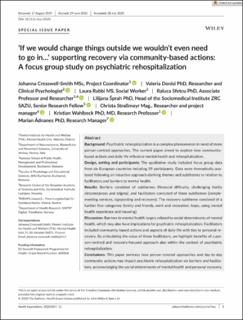| dc.contributor.author | Cresswell-Smith, Johanna | |
| dc.contributor.author | Donisi, Valeria | |
| dc.contributor.author | Rabbi, Laura | |
| dc.contributor.author | Sfetcu, Raluca | |
| dc.contributor.author | Straßmayr, Christa | |
| dc.contributor.author | Wahlbeck, Kristian | |
| dc.contributor.author | Ådnanes, Marian | |
| dc.date.accessioned | 2023-03-09T14:33:58Z | |
| dc.date.available | 2023-03-09T14:33:58Z | |
| dc.date.created | 2021-01-14T11:19:39Z | |
| dc.date.issued | 2020 | |
| dc.identifier.citation | Health Expectations. 2021, 24 (S1), 174-184. | en_US |
| dc.identifier.issn | 1369-6513 | |
| dc.identifier.uri | https://hdl.handle.net/11250/3057448 | |
| dc.description.abstract | Background: Psychiatric rehospitalization is a complex phenomenon in need of more person-centred approaches. The current paper aimed to explore how community-based actions and daily life influence mental health and rehospitalization.
Design, setting and participants: The qualitative study included focus group data from six European countries including 59 participants. Data were thematically analysed following an inductive approach deriving themes and subthemes in relation to facilitators and barriers to mental health.
Results: Barriers consisted of subthemes (financial difficulty, challenging family circumstances and stigma), and facilitators consisted of three subthemes (complementing services, signposting and recovery). The recovery subtheme consisted of a further five categories (family and friends, work and recreation, hope, using mental health experience and meaning).
Discussion: Barriers to mental health largely related to social determinants of mental health, which may also have implications for psychiatric rehospitalization. Facilitators included community-based actions and aspects of daily life with ties to personal recovery. By articulating the value of these facilitators, we highlight benefits of a person-centred and recovery-focused approach also within the context of psychiatric rehospitalization.
Conclusions: This paper portrays how person-centred approaches and day-to-day community actions may impact psychiatric rehospitalization via barriers and facilitators, acknowledging the social determinants of mental health and personal recovery. | en_US |
| dc.language.iso | eng | en_US |
| dc.publisher | Wiley | en_US |
| dc.rights | Navngivelse 4.0 Internasjonal | * |
| dc.rights.uri | http://creativecommons.org/licenses/by/4.0/deed.no | * |
| dc.title | ‘If we would change things outside we wouldn’t even need to go in…’ supporting recovery via community‐based actions: A focus group study on psychiatric rehospitalization | en_US |
| dc.type | Peer reviewed | en_US |
| dc.type | Journal article | en_US |
| dc.description.version | publishedVersion | en_US |
| dc.rights.holder | © 2020 The Authors. | en_US |
| dc.source.pagenumber | 174-184 | en_US |
| dc.source.volume | 24 | en_US |
| dc.source.journal | Health Expectations | en_US |
| dc.source.issue | S1 | en_US |
| dc.identifier.doi | 10.1111/hex.13125 | |
| dc.identifier.cristin | 1871202 | |
| cristin.ispublished | true | |
| cristin.fulltext | original | |
| cristin.qualitycode | 1 | |

